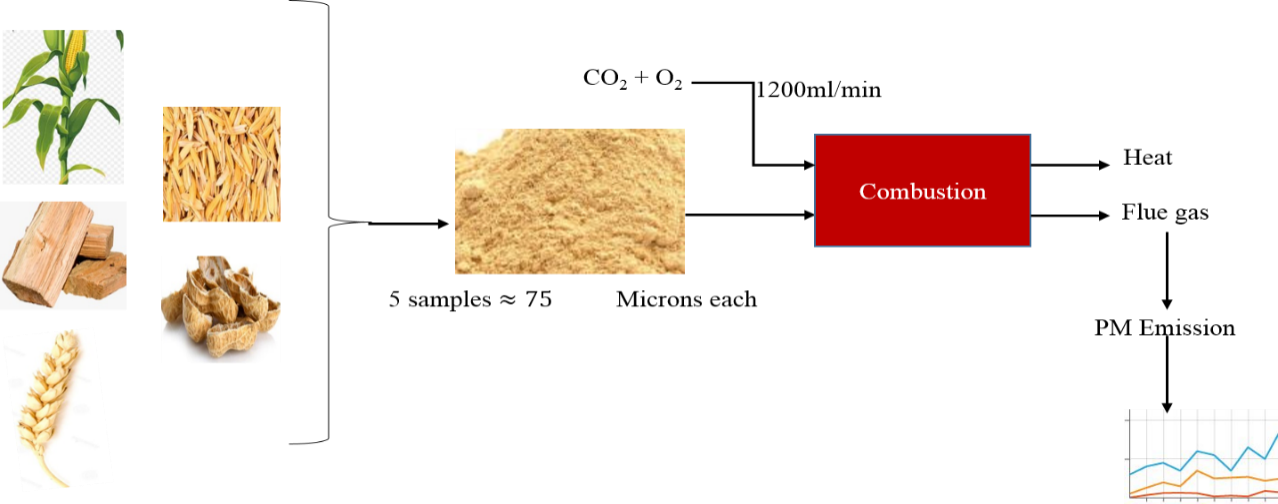 Open Access
Open Access
ARTICLE
Effect of Varying Temperature and Oxygen on Particulate Matter Formation in Oxy-Biomass Combustion
1 Fujian Provincial Higher–Educational Engineering Research Centre of Intelligence and Automation in Construction, College of Civil Engineering, Huaqiao University, Xiamen, China
2 Kenya Industrial Research and Development Institute, Nairobi, Kenya
3 Hello Renewables, Ltd., Kigali, Rwanda
4 Mount Kenya University, Thika, Kenya
5 African Centre of Excellence in Energy for Sustainable Development, University of
Rwanda, Kigali, Rwanda
6 Morayo College, Nairobi, Kenya
7 Fujian Baichuan Construction Technology Co., Ltd., Xiamen, China
8 Haoqi (Xiamen) Construction Technology Co., Ltd., Xiamen, China
9 University of Rwanda, College of Science and Technology, Kigali, Rwanda
* Corresponding Author: Cicilia Kemunto Mesa. Email:
(This article belongs to the Special Issue: Advanced Materials and Technologies for Sustainable Energy)
Energy Engineering 2022, 119(3), 863-881. https://doi.org/10.32604/ee.2022.019248
Received 11 September 2021; Accepted 12 January 2022; Issue published 31 March 2022
Abstract
Offsetting particulate matter emissions has become a critical global aim as there are concerted efforts to deal with environmental and energy poverty challenges. This study consists of investigations of computing emissions of particulate matter from biomass fuels in various atmospheres and temperatures. The laboratory setup included a fixed bed electric reactor and a particulate matter (PM) measuring machine interfaced with the flue gas from the fixed bed reactor combustion chamber. The experiments were conducted at seven different temperatures (600°C–1200°C) and six incremental oxygen concentrations (21%–100%). Five biomass types were studied; A-cornstalk, B-wood, C-wheat straw, D-Rice husk, E-Peanut shell, each pulverized to a size of approximately 75 microns. The study shows that PM emitted during char combustion is consistently higher than that emitted during the de-volatilization. During de-volatilization, increase in temperature leads to linear decrease in PM emission between atmospheres of 21%O2 to 50%O2, thereafter, between 70%O2 to 100%O2; increase in temperature leads to a rise in PM emission. The average PM formation from all the five considered biomass is relatively comparable however, with differing atmospheres and temperatures, the fibrous and low-density biomass forms more PM. During char combustion, the study shows that at oxygen levels of 21%, 70%, 90% and 100%, increase in temperature leads to increased PM emission. The increase in oxygen concentration and temperature increases the rate of combustion hence diminishing the time of combustion.Graphic Abstract

Keywords
Cite This Article
 Copyright © 2022 The Author(s). Published by Tech Science Press.
Copyright © 2022 The Author(s). Published by Tech Science Press.This work is licensed under a Creative Commons Attribution 4.0 International License , which permits unrestricted use, distribution, and reproduction in any medium, provided the original work is properly cited.


 Submit a Paper
Submit a Paper Propose a Special lssue
Propose a Special lssue View Full Text
View Full Text Download PDF
Download PDF Downloads
Downloads
 Citation Tools
Citation Tools